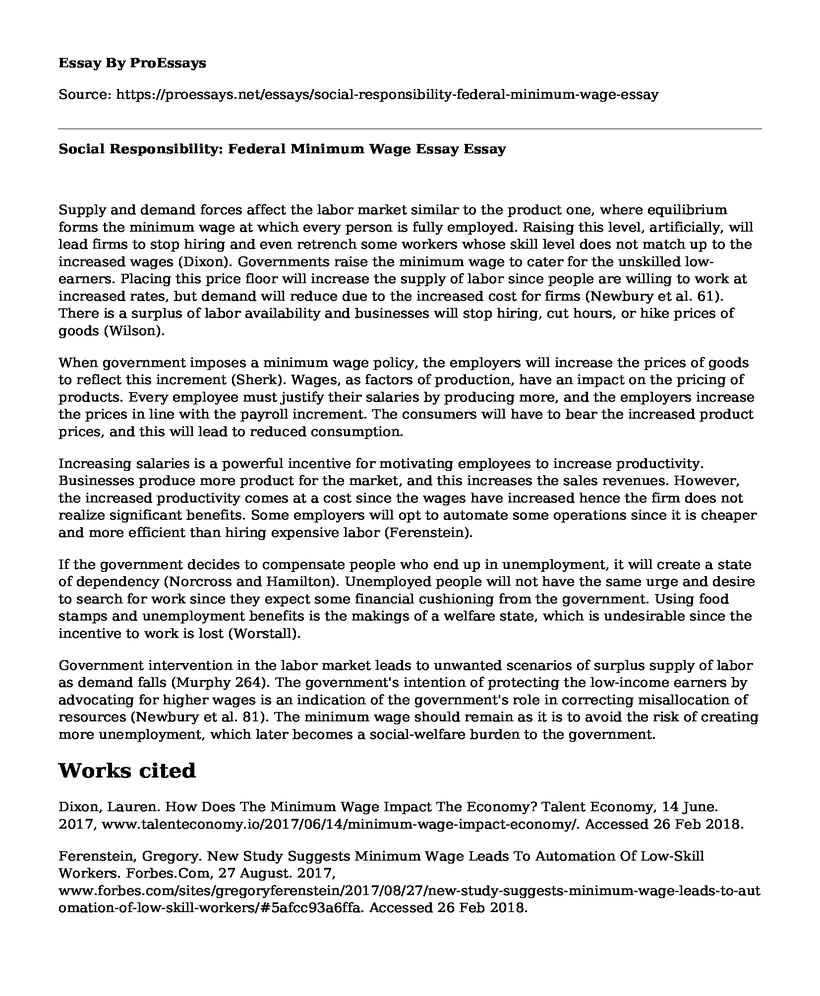Supply and demand forces affect the labor market similar to the product one, where equilibrium forms the minimum wage at which every person is fully employed. Raising this level, artificially, will lead firms to stop hiring and even retrench some workers whose skill level does not match up to the increased wages (Dixon). Governments raise the minimum wage to cater for the unskilled low-earners. Placing this price floor will increase the supply of labor since people are willing to work at increased rates, but demand will reduce due to the increased cost for firms (Newbury et al. 61). There is a surplus of labor availability and businesses will stop hiring, cut hours, or hike prices of goods (Wilson).
When government imposes a minimum wage policy, the employers will increase the prices of goods to reflect this increment (Sherk). Wages, as factors of production, have an impact on the pricing of products. Every employee must justify their salaries by producing more, and the employers increase the prices in line with the payroll increment. The consumers will have to bear the increased product prices, and this will lead to reduced consumption.
Increasing salaries is a powerful incentive for motivating employees to increase productivity. Businesses produce more product for the market, and this increases the sales revenues. However, the increased productivity comes at a cost since the wages have increased hence the firm does not realize significant benefits. Some employers will opt to automate some operations since it is cheaper and more efficient than hiring expensive labor (Ferenstein).
If the government decides to compensate people who end up in unemployment, it will create a state of dependency (Norcross and Hamilton). Unemployed people will not have the same urge and desire to search for work since they expect some financial cushioning from the government. Using food stamps and unemployment benefits is the makings of a welfare state, which is undesirable since the incentive to work is lost (Worstall).
Government intervention in the labor market leads to unwanted scenarios of surplus supply of labor as demand falls (Murphy 264). The government's intention of protecting the low-income earners by advocating for higher wages is an indication of the government's role in correcting misallocation of resources (Newbury et al. 81). The minimum wage should remain as it is to avoid the risk of creating more unemployment, which later becomes a social-welfare burden to the government.
Works cited
Dixon, Lauren. How Does The Minimum Wage Impact The Economy? Talent Economy, 14 June. 2017, www.talenteconomy.io/2017/06/14/minimum-wage-impact-economy/. Accessed 26 Feb 2018.
Ferenstein, Gregory. New Study Suggests Minimum Wage Leads To Automation Of Low-Skill Workers. Forbes.Com, 27 August. 2017, www.forbes.com/sites/gregoryferenstein/2017/08/27/new-study-suggests-minimum-wage-leads-to-automation-of-low-skill-workers/#5afcc93a6ffa. Accessed 26 Feb 2018.
Murphy, Robert. Lessons for the Young Economist. Ludwig Von Mises Institute, 2012.
Newbury, Fred et al. Principles of Macroeconomics: Understanding Our Material World. 4th ed., Kendall Hunt Publishing Co, 2017.
Norcross, Eileen, and Emily Hamilton. The Costs and Consequences of Unemployment Benefits on the States. Mercatus Center, 24 January. 2010, www.mercatus.org/publication/costs-and-consequences-unemployment-benefits-states. Accessed 26 Feb 2018.
Sherk, James. $15 Minimum Wages Will Substantially Raise Prices. 19 January. The Heritage Foundation, 2017, www.heritage.org/jobs-and-labor/report/15-minimum-wages-will-substantially-raise-prices. Accessed 26 Feb 2018.
Wilson, Mark. The Negative Effects of Minimum Wage Laws. Downsizing the Federal Government, 1 September. 2012, www.downsizinggovernment.org/labor/negative-effects-minimum-wage-laws. Accessed 26 Feb 2018.
Worstall, Tim. Increased Welfare Benefits Really Do Reduce The Employment Rate. Forbes.Com, 20 February. 2015, www.forbes.com/sites/timworstall/2015/02/20/increased-welfare-benefits-really-do-reduce-the-employment-rate/#31e3aa437e3a. Accessed 26 Feb 2018.
Cite this page
Social Responsibility: Federal Minimum Wage Essay. (2022, Mar 29). Retrieved from https://proessays.net/essays/social-responsibility-federal-minimum-wage-essay
If you are the original author of this essay and no longer wish to have it published on the ProEssays website, please click below to request its removal:
- Essay Example on Performance Management
- Essay Example: Antitrust Legislation
- Paper Example on Google's Business Model
- Motivation Letter for the Application of Local Coordinator for the Erasmus + Office in Kosovo
- Interview Project Paper on Moral Ethics in Social Work
- Positive Risk: Unlocking Opportunities for Projects - Essay Sample
- Essay Sample on Modern Healthcare: CEOs Facing Strict Measures to Meet Medical Demands







